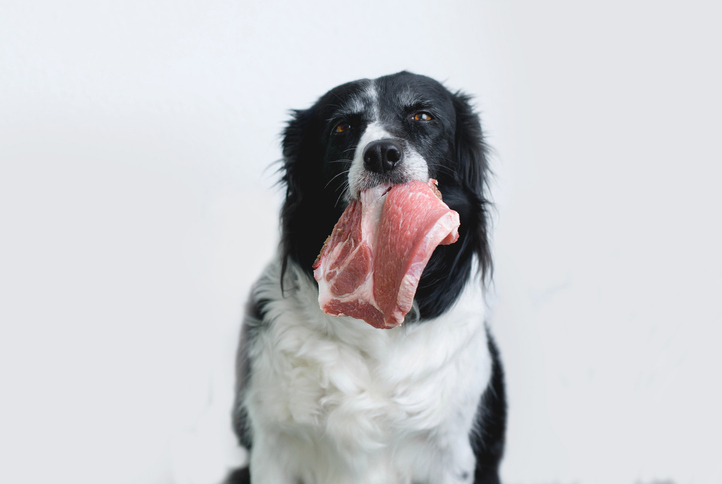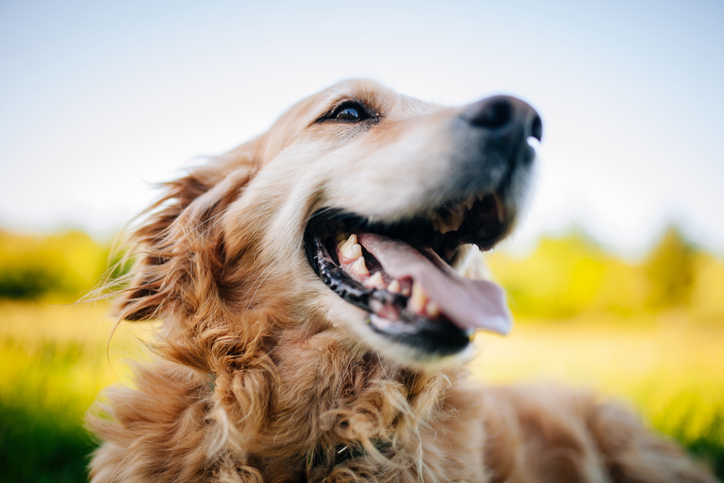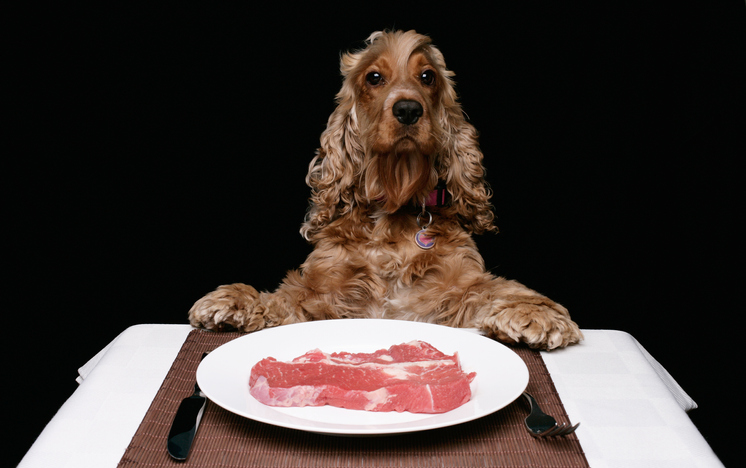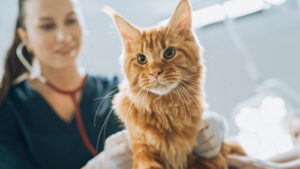Feeding dogs raw food has become increasingly popular among dog owners in recent years. One common raw food ingredient is raw beef, which many believe provides essential nutrients and promotes overall health. So, is raw beef safe for dogs?
Although dogs can eat raw beef, there are still risks associated it that should be considered. At the end of the day, it is up to you and your veterinarian’s recommendations for your pup’s raw beef consumption.
In this article, we will examine the risks associated with feeding raw beef to dogs and discuss the precautions you should take to ensure your dog’s safety and health.

The Risks of Feeding Raw Beef to Dogs
Bacterial Contamination
One of the primary concerns with feeding raw beef to dogs is the potential for bacterial contamination. Raw meat can be a breeding ground for harmful bacteria, such as Salmonella, E. coli, and Listeria, which can cause serious illness in both dogs and humans. If your dog consumes contaminated raw beef, they may suffer from vomiting, diarrhea, lethargy, and other symptoms of foodborne illness. Moreover, handling raw beef improperly can put you and your family at risk of bacterial infection as well.
Parasites
Raw beef can also contain parasites, such as tapeworms and roundworms, which can infest your dog’s intestinal tract and lead to various health problems. Some parasites can even be transmitted to humans, posing a risk to your family’s health.
Choking Hazards and Digestive Obstruction
Feeding large chunks of raw beef or beef bones to your dog can pose a choking hazard or lead to digestive obstruction. Dogs may not chew their food thoroughly, and large pieces of meat or bone can become lodged in their throat or digestive tract, causing serious complications.
Imbalanced Nutrition
Feeding a raw diet, including raw beef, requires careful planning and knowledge to ensure your dog receives a balanced and complete diet. If you do not provide the appropriate balance of nutrients, your dog may suffer from nutritional deficiencies or imbalances, which can lead to health issues and developmental problems.
Precautions When Feeding Raw Beef to Dogs
While raw beef can be a healthy addition to your dog’s diet, it is important to take certain precautions to ensure their safety. One of the main risks associated with feeding raw meat to dogs is the potential for bacterial contamination. Raw meat can contain harmful bacteria such as Salmonella and E. coli, which can cause illness in dogs and humans alike.
To minimize the risks associated with feeding your pup raw beef, follow the precautions we have listed in our article.
Purchase High-Quality Meat
If you choose to feed your dog raw beef, ensure you are purchasing high-quality, human-grade meat from a reliable source. Selecting fresh, lean cuts of beef and avoiding processed or ground meat can help minimize the risk of bacterial contamination and parasites.
Proper Food Handling and Hygiene
Practice safe food handling techniques when preparing raw beef for your dog. Always wash your hands thoroughly before and after handling raw meat, and sanitize all surfaces and utensils that come into contact with the beef. Store raw beef separately from other foods in the refrigerator and promptly dispose of any leftovers.
Consider Freezing Raw Beef
Freezing raw beef for at least 24 hours before feeding it to your dog can help to kill some parasites and reduce the risk of infection. However, freezing does not eliminate all potential pathogens, and proper food handling practices are still essential.
Bone Safety
If you choose to feed your dog raw bones, ensure you are selecting appropriately sized, non-splintering bones to minimize choking hazards and digestive obstruction risks. It is generally safer to provide larger, non-weight-bearing bones, such as beef knuckle bones, rather than smaller or more brittle bones, like rib bones.
Consult with a Veterinarian or Canine Nutritionist
Before transitioning your dog to a raw diet, consult with a veterinarian or canine nutritionist to determine whether it is safe and appropriate for your individual dog. They can provide guidance on the nutritional requirements of your dog and help you make informed decisions about their diet.
Benefits of Feeding Raw Beef to Dogs

In addition to being a good source of protein, raw beef can also provide a range of other nutrients that are beneficial to dogs. These nutrients include essential fatty acids, vitamins, and minerals that can contribute to your dog’s overall health and well-being. Raw beef is also a great source of amino acids, which are essential for building and maintaining strong muscles, bones, and tissues.
One of the main benefits of feeding raw beef to dogs is that it can help improve their coat and skin health. The omega-3 fatty acids found in beef can help reduce inflammation and promote healthy skin and a shiny coat. Additionally, the zinc and B vitamins found in beef can help improve skin health and promote hair growth.
Another benefit of feeding raw beef to dogs is that it can help support their immune system. Beef is rich in antioxidants, which can help fight off harmful free radicals and protect cells from damage. Additionally, the vitamins and minerals found in beef can help support a healthy immune system and prevent illness and disease.
Conclusion
Raw beef can be a healthy and nutritious addition to your dog’s diet when handled and prepared properly. However, it is crucial to take the necessary precautions and ensure that the meat is fresh, properly stored, and sourced from a reputable supplier.
It is best to consult with your veterinarian before putting your dog on a diet with raw beef. If you are looking for a veterinarian, Loveland Regional Animal Hospital in Loveland, OH is here to help! Give us call at (513) 697-9796 or make an appointment online today!





